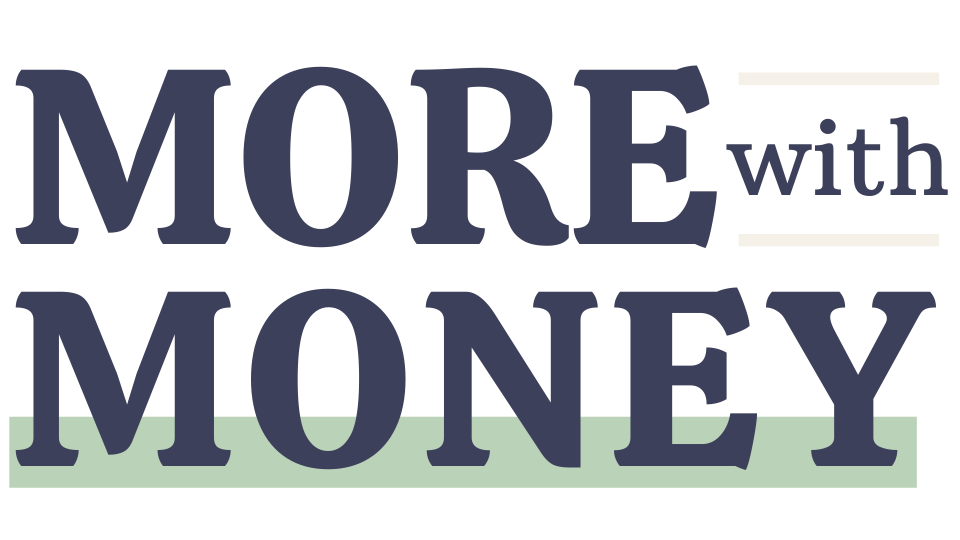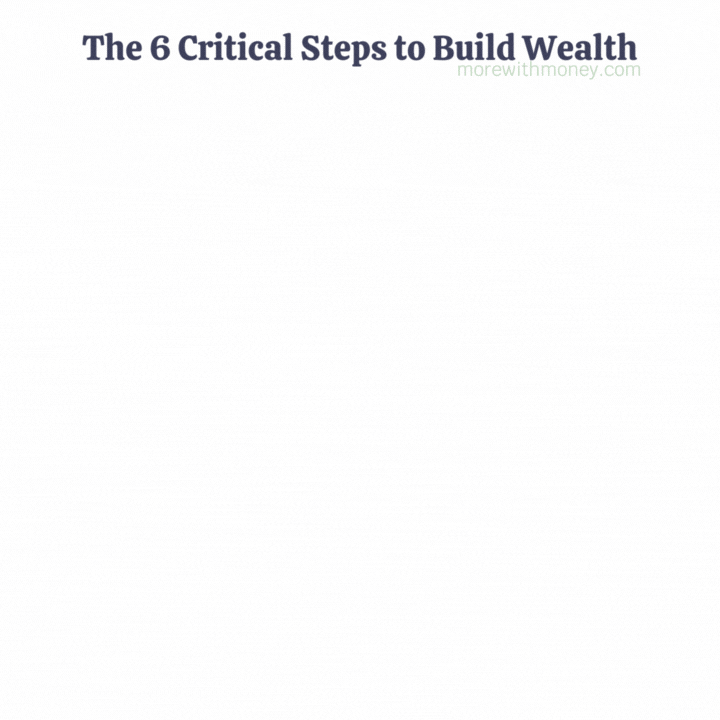The 6 Critical Steps to Build Wealth the Smart and Stable Way
What are the steps to building wealth? Should you pay off debt, fund a retirement account, or buy the house first? Building wealth can feel like an impossible journey with all the different financial goals you're supposed to set, so let's break the journey down into 6 priority steps to pursue - in order!
What Are the Steps to Building Wealth?
We make our best financial progress when we narrow our focus to a single priority at a time. Granted, finances are never that simple and there will always be other things going on at the same time. However, to have a financial focus simply means that you have a general direction you know you’re trying to work towards.
The six steps I’m presenting to you today will give you a priority order to work through in your finances to build wealth. You may notice that they come in an alternating “SP” pattern and can be remembered as Secure, Prepare, Save, Pay Off, Scale, and Propel.
I don’t write this post to be dismissive of challenging life circumstances, privilege, discrimination, poverty, inequality, disability, or any other limiting factors that have held so many people back. If anything, I’m writing this post specifically for you, if this is your current story.
1. Secure the Month-to-Month
Before you can handle any other financial goal, you need to ensure you’re able to support your monthly obligations. This means paying the regular bills, putting food on the table, and generally keeping yourself afloat.
This also includes being able to pay just the minimum payments on your debts AND not going into any more debt.
Note: Take a moment to do the math on your minimum payments. Some minimums, especially with student loans, aren’t high enough to cover interest, so you’re going to owe MORE than where you started if you don’t increase your payment!
You will not be able to make progress until you can reasonably cash flow your monthly cost of living.
Creating a cash-based spending plan for every dollar you have and every dollar you’ll earn is the key to achieving this basic (though not always easy) level of stability. (This link is a guide to business budgeting, but the principles can be applied to personal finance as well!)
2. Prepare for the “Inevitables”
Think back to the last financial emergency you had that set you back. Then consider, was that an emergency because you didn’t know it would happen or because you simply weren’t prepared for it?
Preparing for the “inevitables” in your life that most people forget to include in their monthly budget will give you the cash leverage you need to stay out of debt and pursue other financial goals without taking 10 steps backward every few months.
Brainstorm a list of everything you have that’s:
Infrequent (like annual subscriptions or back-to-school shopping), or
Irregular (like car maintenance or travel), or
Just plain Icky (like home repairs or medical emergencies)
Try to assign a dollar value to how much you’d ideally have set aside for this purpose. Total it up, divide by 12, and round up - there’s your monthly “sinking fund” goal to set aside.
You CAN get more granular to track your savings for each fund (I do!), but you don’t have to start that way.
3. Save a Starter Emergency Fund
This fund differs from your sinking funds because ideally, it’s never going to be used. As you get better at building up sinking funds (which are meant to be used), you’ll create a cash cushion that further protects your emergency fund.
But, having one will give you a significantly higher sense of security that you’re not sending away money you desperately need to your creditors or retirement accounts later on. Remember, cash on hand is power.
There are different rules of thumb on how much you should save for an emergency fund. If you have debt or another major financial need you need to prioritize (such as saving for a home or much-needed vehicle), then I’d recommend just a starter fund in the $1,000 to $3,000 range.
Aim to save this up as aggressively and quickly as you can so you can move on to Step 4 or 5!
4. Pay Off Your Debt
As author J L Collins said in his book, The Simple Path to Wealth, “debt is the single most dangerous obstacle to building wealth.”
Debt destroys your income with interest payments. It ties up your cash. It enslaves you to work for money. It increases your stress and triggers negative emotions and associations around money. It imprisons you in the past when you should be looking forward.
Every spare dollar you have needs to go towards debt, throwing all your extra money at one debt at a time. I am a fan of the Debt Snowball approach of prioritizing debts with the smallest balance first, though some prefer to prioritize the highest interest rate first. (Click here to read How to Free Your Wealth Faster with a Progress-Boosting Debt Payoff Strategy.)
Note: In this section, I’m referring to debt outside of a mortgage. Car loans, student loans, credit card debt, personal loans, etc. You’re free to decide when/how you pay down your mortgage when you reach Step 6!
What about employer retirement matches? If cash is tight, prioritize paying off debt. But if you have the margin for it (without sacrificing Steps 1-4) and your/your spouse’s workplace offers it, I do recommend contributing to a 401(k) up to whatever your employer is offering to match. It’s free money for your future!
5. Scale Your Savings
When you reach Step 5, you’re debt free! It might take a while to get to this point, but with the right plan, focus, and commitment I truly believe that you can get here much faster than you previously thought.
Once you’re free of your debt, you’ll have regained your cash flow power and can pour it back towards your future (instead of the past).
I would recommend ramping up your sinking funds and growing your emergency fund. Re-evaluate what you need to be saving for (so you never go back into debt!) and how much you want to have on reserve for emergencies.
The rule of thumb is typically saving 3-6 months’ worth of your living expenses for your emergency fund. Don’t invest this money into an account that you have limited access to - you want to be able to draw from it if you need it.
This step may also be for any other major savings goals you need to prioritize, such as a home, car, college, major travel, etc.
6. Propel Your Investing
Everything we’ve done up until this point is still a part of “building wealth.” But now, we’re able to accelerate that financial growth exponentially.
This topic is a complex one, and I’m not fully qualified to teach all the nuances. However, I do want to provide the fundamental knowledge and general direction necessary to help you start to make sense of this world.
For now, I’ll boil down investments into the three main areas of opportunity for you to make your money work for you. Remember: the best wealth portfolios are diverse!
The Stock Market - Investing in the stock market is a great long-term, passive strategy for growing wealth. You would do this first through retirement accounts such as 401(k)s or IRAs. Then, if you max those out for the year, you can open an investment account offered by companies like Vanguard. I recommend the book The Simple Path to Wealth by J.L. Collins - it’s not the most thrilling read, but it’s a great perspective shift on the security of investing in the stock market and teaches you a lot about index funds (one of the safer ways to invest)!
Real Estate - While not an area I have extensive knowledge in, I do believe that when done right, real estate can be a great source of fairly passive income. At the very least, owning your own primary home is still a great wealth indicator. Please note that I am personally extremely cautious of “debt leveraging” strategies for investing in real estate. Borrowing heavily to fund investments always comes at extreme risk!-
Your Business - While not talked about as often, depending on how you grow your business, it can become such a powerful source of passive, scalable income for you over time! And the best part is that it can fund itself, so you technically aren’t investing money into it once you get past the start-up phase. Is your business part of your retirement plan?
7 Financial Success Habits to Maintain
I wanted to leave you with a few more nuggets of wisdom for your wealth-building journey. On top of the specific financial goals you may have, there are certain financial habits and perspectives you’ll need to nurture over time to achieve your financial success.
Learn - Keep learning and growing your knowledge! The more you understand money, the better you can manage it.
Budget - Budgeting isn’t just for poor people. Being proactive and intentional with your money is a lifelong habit for not only building wealth but preserving it.
Breathe - Always give yourself breathing room in your budget. You are a human being, and your finances reflect YOU. Build fun, flexibility, and grace into all of your financial plans!
Focus - Set specific goals and adjust your priorities through the different seasons of your life. Again, be flexible! But stay focused as well. Don’t try to do everything all at once.
Pursue - Pursue diverse, scalable, and value-driven income. While it’s not about “limitless income”, the fact remains that the more you earn, the easier it can be to reach your goals. Just don’t go overboard. 😉
Practice - Always practice contentment and gratitude. It’ll make this journey so much more fulfilling! And try to avoid unnecessarily raising your standard of living over time, even as your income increases.
Lean - Lean on support. Don’t try to do this alone! Communicate with your partner. Surround yourself with friends who encourage you to live out your values. Pursue your goals alongside accountability partners and peers who understand what you’re trying to achieve.
Are you ready to take your financial journey to the next level? Then you may be ready to check out the More With Money Academy!
This ever-growing collection of online courses and trainings are specially designed to support entrepreneurs like you on your path to financial wellness. The Academy contains carefully designed courses that are easy to understand and implement so that you can be empowered with the practical concepts, streamlined systems, and powerful mindset to transform your business and personal finances.
Click here to explore what the More With Money Academy has to offer!
Pin for later
I'd love to continue the conversation in the comments! Feel free to share your thoughts.
Until next time!








